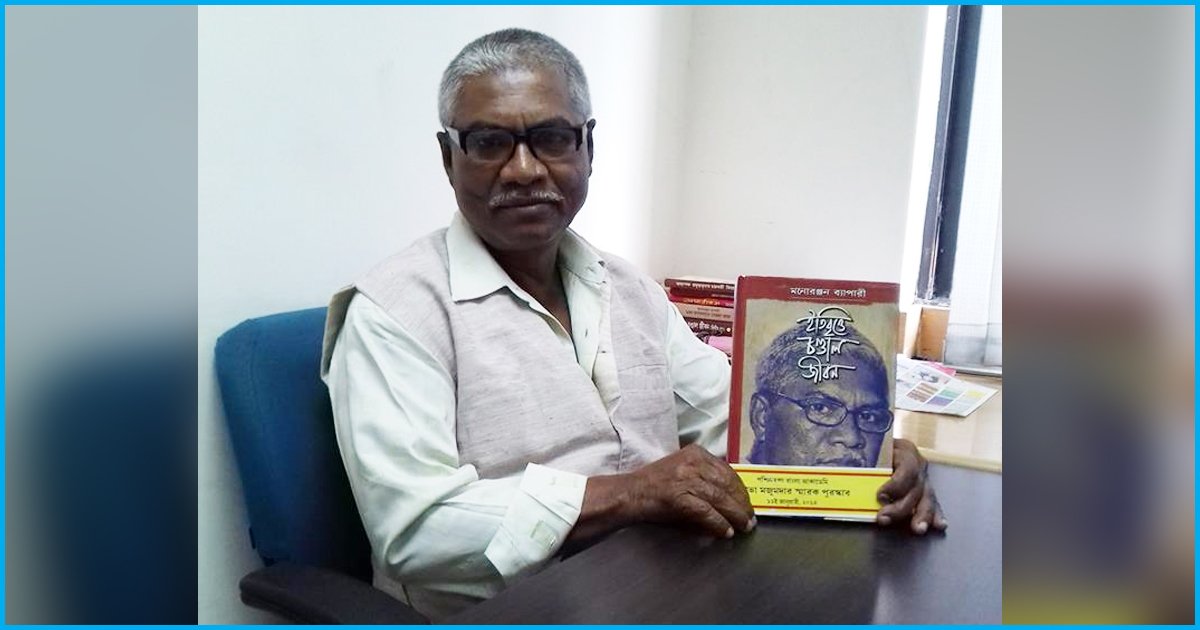
Meet The Rickshaw Puller Turned Writer Who Inspired Many With His Speech In This Year’s Jaipur Lit Fest.
7 Feb 2018 11:11 AM GMT
Schools play an important part in educating a person, but that does not mean that somebody who did not get the opportunity to go to school cannot shine in life. Such is the story of Manoranjan Byapari. A former naxalite and rickshaw puller in Kolkata, Byapari is famously recognized as one of the most celebrated writers of Dalit literature in Bengali.
For the 11th Jaipur Literature Festival, several speakers were invited from India and across the world. However, Manoranjan stole everybody’s hearts with his speech. He has written several novels and over 100 short stories and surprisingly, his first story of 20 pages was published by the great Indian writer ‘Mahasweta Devi’ in her journal Bartika.
Byapari’s meeting with Mahasweta Devi
Byapari was a rickshaw puller in the chaotic streets of Kolkata. While, following his usual routine, a passenger boarded his rickshaw and he asked her the meaning of the Bengali word ‘jijibisha’ as he thought the sari-clad passenger, whom he received from a college, must be a professor.
Surprised, the passenger said, “It means ‘the will to live’.” Further, the passenger asked, “Where did you get the word from?” “From a book,” the rickshaw-puller replied. When the passenger asked how far you he had studied, he said that he didn’t go to school and was self-taught. The passenger who was impressed with the rickshaw puller asked him if he would be interested in writing his story, giving him a piece of paper with her name and address. Amazingly, the name was ‘Mahasweta Devi’.
At Jaipur Literature Festival, Byapari said “I was shocked to learn that my passenger was one of the most famous writers in Kolkata. It was an incident that occurred nearly four decades ago and gradually it changed my life.” While recounting the incident, he further said that the fate on that day was a book of Devi, a collection of short stories titled Agnigarbha, which was kept under the seat of my rickshaw and she was happy to know that I was reading her book.
As directed by Devi, Byapari finally wrote a story of 20 pages and handed them to her. Byapari’s first story titled ‘I Drive a Rickshaw’ appeared in early 1981 in Bartika, a Bengali magazine published by Devi. Byapari also talked about his autobiographical novel, Itibritte Chandal Jiban which is now available in English as Interrogating My Chandal Life: An Autobiography of a Dalit. “It’s not literature,” Byapari told his audience. “It’s the truth.” One of the directors of the festival, Author Namita Gokhale who was responsible for selecting Indian writers for the event, described Byapari’s life as an ‘incredible’ story. “It’s incredible how he met Mahasweta Devi while pulling a rickshaw in Kolkata,” Gokhale added.
Byapari’s Background
Byapari was born in Barisal district of Bangladesh (then East Pakistan) in 1950. As a young boy, he spent his life in a refugee camp in West Bengal after his parents decided to migrate to India three years later. In order to earn his daily meal, he worked in Dhabas, washed plates and even became a revolutionary that landed him in jail. What is surprising the most is that the place where he learned to read was in a jail. After coming out of jail, he became a rickshaw puller who loves to read books. Later, he went to Chhattisgarh in the 80s and then came an interlude when he started working with Chhattisgarh Mukti Morcha leader Shankar Guha Niyogi. Unfortunately, Niyogi got assassinated in 1991. Byapari returned to Kolkata and continued to write novels, short stories, and essays. All his books revolved around the struggles of marginalized people like him, an influence of Devi whose works like Hajar Churashir Maa talked about poor people with strong will.
An Inspiring Ending Note From His Speech
Byapari’s delivered a similar keynote addressed as Devi’s about five years ago at the Jaipur Literature Festival. Explaining his own works, he too called himself “a writer in anguish”. “I write because I am angry.” “The wheels turned and we moved closer to our destination,” he writes in Interrogating My Chandal Life about his encounter with Devi in 1980. “But which wheels were really turning? The rickshaw wheels or the wheels of my destiny? Which moved forward? Was it just my rickshaw or was it me?”
He also told his audience that he left the job of pulling rickshaws two decades ago and later, he moved from Kolkata to Khudirabad in 24 Parganas district of West Bengal. There is a Helen Keller School for the Deaf and the Blind in Khudirabad where Byapari and his colleagues cook food for 300 students every day. “That’s my job,” he added before running his fingers on the chequered scarf on his neck. He stressed “This scarf is enough for me. I can lay it on the ground and sleep, tie it as a turban or put a copy of the Bhagavad Gita and sling it as a weapon.” “It’s a searing image, like that of Kolkata rickshaw-puller Hasari Pal in Dominique Lapierre’s 1985 novel City of Joy, but with a fierce determination, stronger voice and a mighty pen,” he further added.
 All section
All section













